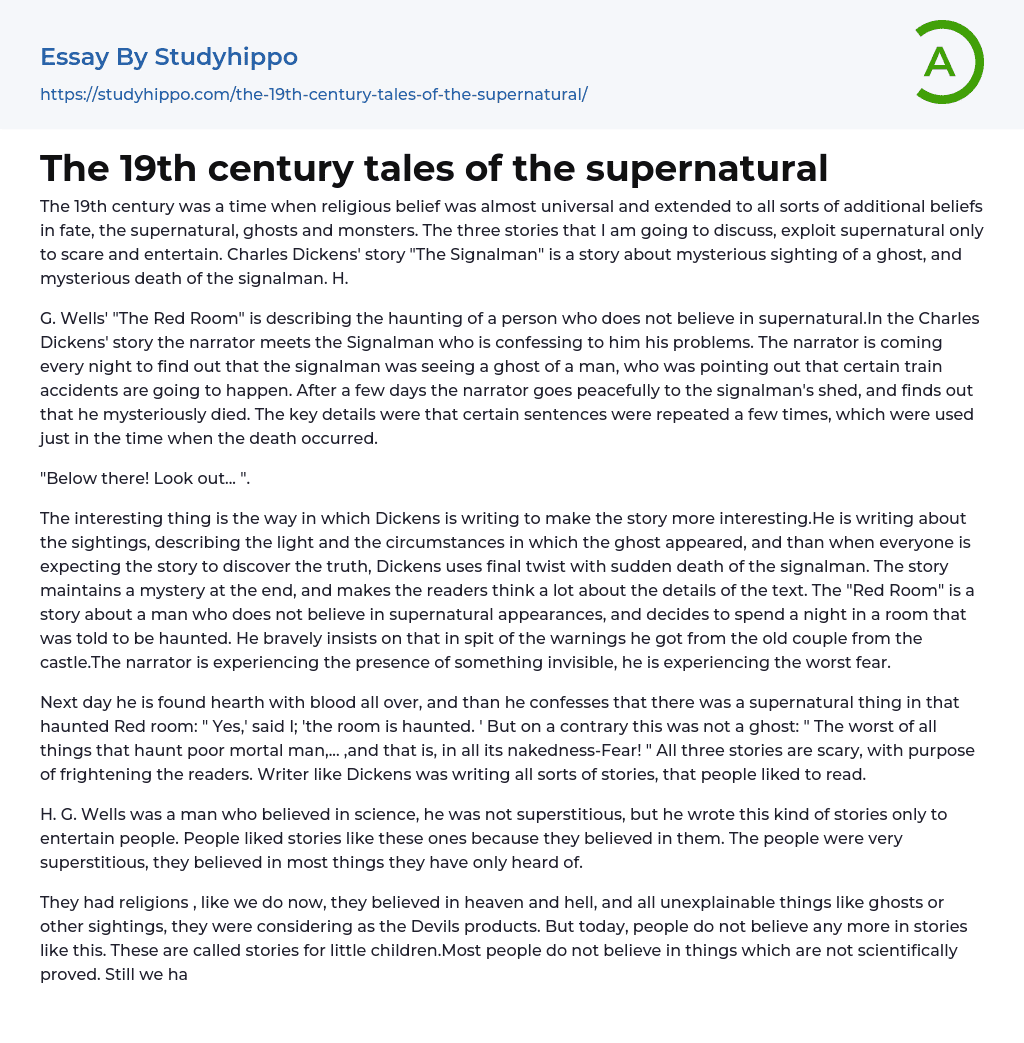The 19th century was a time when religious belief was almost universal and extended to all sorts of additional beliefs in fate, the supernatural, ghosts and monsters. The three stories that I am going to discuss, exploit supernatural only to scare and entertain. Charles Dickens' story "The Signalman" is a story about mysterious sighting of a ghost, and mysterious death of the signalman. H.
G. Wells' "The Red Room" is describing the haunting of a person who does not believe in supernatural.In the Charles Dickens' story the narrator meets the Signalman who is confessing to him his problems. The narrator is coming every night to find out that the signalman was seeing a ghost of a man, who was pointing out that certain train accidents are going to happen. After a few days the narrator goes
...peacefully to the signalman's shed, and finds out that he mysteriously died. The key details were that certain sentences were repeated a few times, which were used just in the time when the death occurred.
"Below there! Look out... ".
The interesting thing is the way in which Dickens is writing to make the story more interesting.He is writing about the sightings, describing the light and the circumstances in which the ghost appeared, and than when everyone is expecting the story to discover the truth, Dickens uses final twist with sudden death of the signalman. The story maintains a mystery at the end, and makes the readers think a lot about the details of the text. The "Red Room" is a story about a man who does not believe in supernatural appearances, and decides to spend a night i
a room that was told to be haunted. He bravely insists on that in spit of the warnings he got from the old couple from the castle.The narrator is experiencing the presence of something invisible, he is experiencing the worst fear.
Next day he is found hearth with blood all over, and than he confesses that there was a supernatural thing in that haunted Red room: " Yes,' said I; 'the room is haunted. ' But on a contrary this was not a ghost: " The worst of all things that haunt poor mortal man,... ,and that is, in all its nakedness-Fear! " All three stories are scary, with purpose of frightening the readers. Writer like Dickens was writing all sorts of stories, that people liked to read.
H. G. Wells was a man who believed in science, he was not superstitious, but he wrote this kind of stories only to entertain people. People liked stories like these ones because they believed in them. The people were very superstitious, they believed in most things they have only heard of.
They had religions , like we do now, they believed in heaven and hell, and all unexplainable things like ghosts or other sightings, they were considering as the Devils products. But today, people do not believe any more in stories like this. These are called stories for little children.Most people do not believe in things which are not scientifically proved. Still we have not lost our interest in supernatural.
A lot of other writers started writing books, on the idea of the ones from 19th century. A big part of literature is based on the genres, like
horrors, or science-fiction. And people are reading it to entertain themselves, and not to believe in them. The evidence of this includes the huge popularity of writers like Stephen King, who uses the same method like Dickens tension through the whole story and than twist at the end; or films such as The Blair Which Project.
- Book Summary essays
- Metaphor essays
- Reader essays
- Rhyme essays
- Literary devices essays
- Villain essays
- Books essays
- Genre essays
- Literary Criticism essays
- Writer essays
- Protagonist essays
- Simile essays
- Poem essays
- Book Report essays
- Book Review essays
- Greek Mythology essays
- Plot essays
- Tragic Hero essays
- Coming of Age essays
- Play essays
- Rhetoric essays
- Rhetorical Question essays
- Translation essays
- Understanding essays
- Reason essays
- Character essays
- Letter essays
- American Literature essays
- Literature Review essays
- Utopia essays
- Poetry Analysis essays
- Dante's Inferno essays
- Between The World and Me essays
- Incidents in The Life of a Slave Girl essays
- Flowers for Algernon essays
- Myth essays
- Everyday Use essays
- Boo Radley essays
- Genesis essays
- Richard iii essays
- Alice in Wonderland essays
- On the road essays
- Ozymandias essays
- The Nightingale essays
- Holden Caulfield essays
- Animal Farm essays
- 1984 essays
- A Hanging essays
- Shooting An Elephant essays
- A Tale Of Two Cities essays




